人教版高中英语必修5 unit5 First Aid复习课件 (87张)
文档属性
| 名称 | 人教版高中英语必修5 unit5 First Aid复习课件 (87张) |
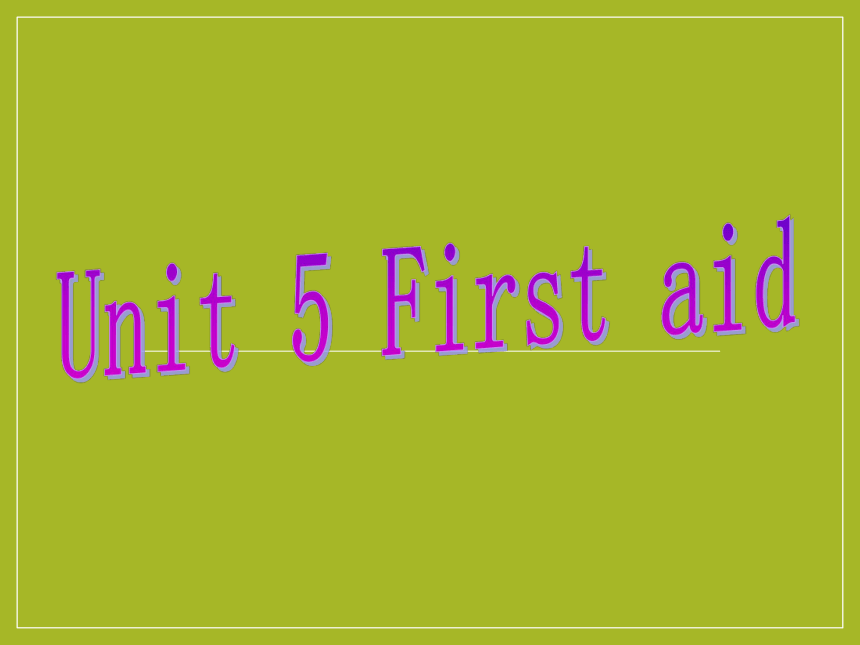
|
|
| 格式 | zip | ||
| 文件大小 | 369.1KB | ||
| 资源类型 | 教案 | ||
| 版本资源 | 人教版(新课程标准) | ||
| 科目 | 英语 | ||
| 更新时间 | 2020-05-18 11:37:49 | ||
图片预览

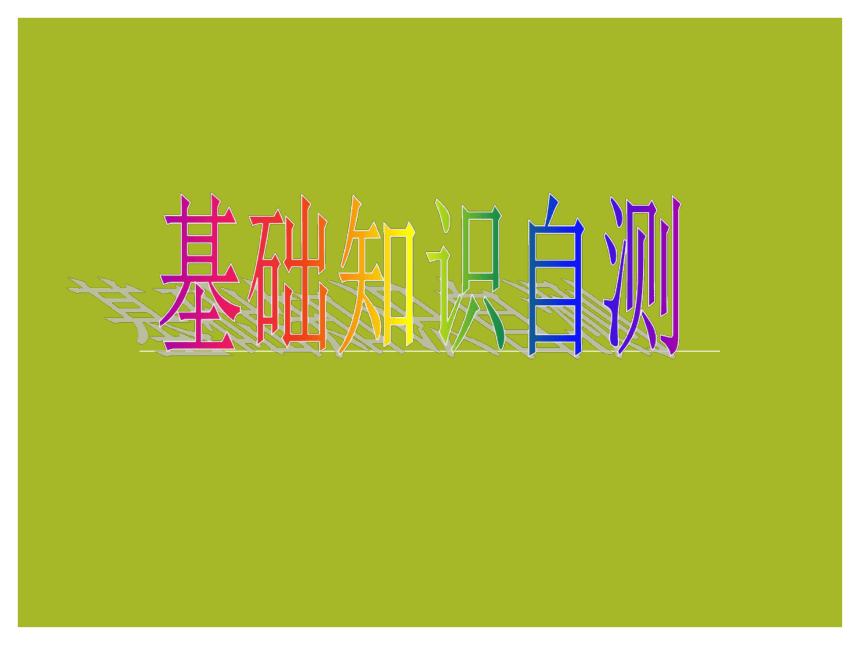
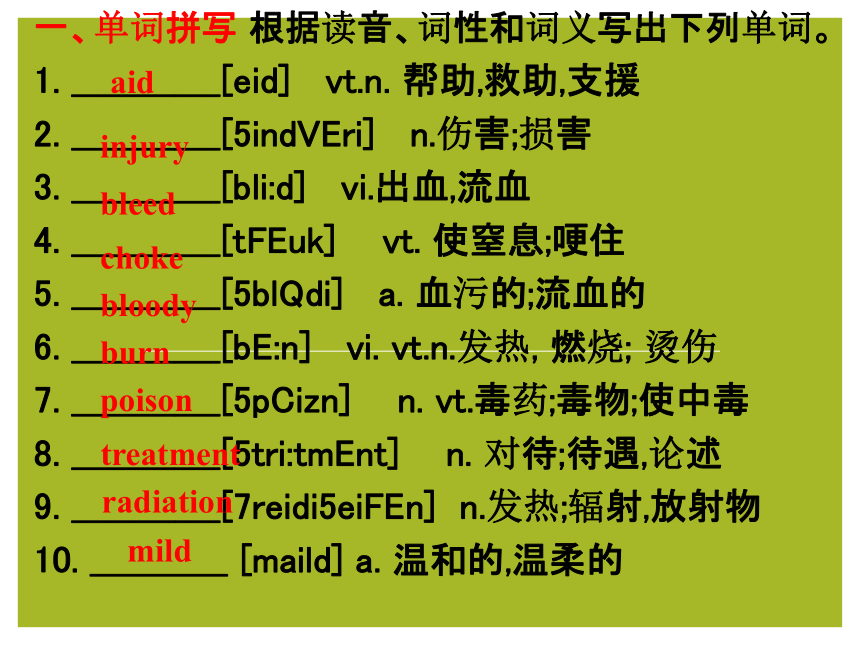
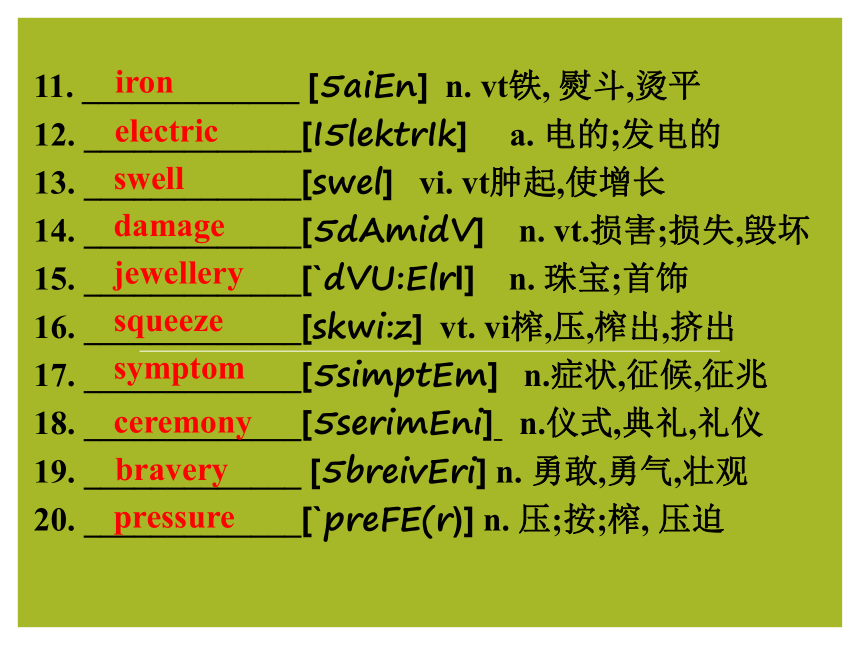
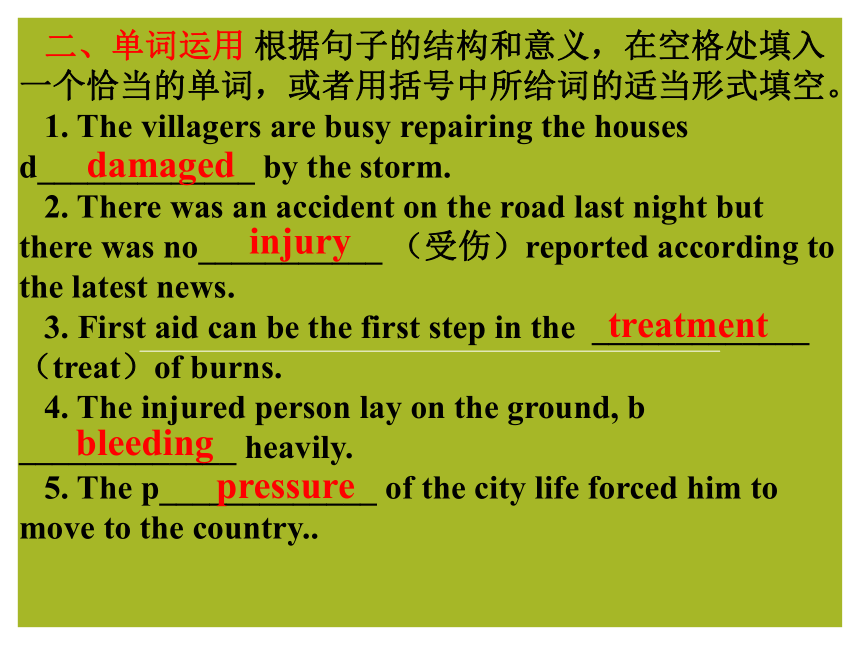
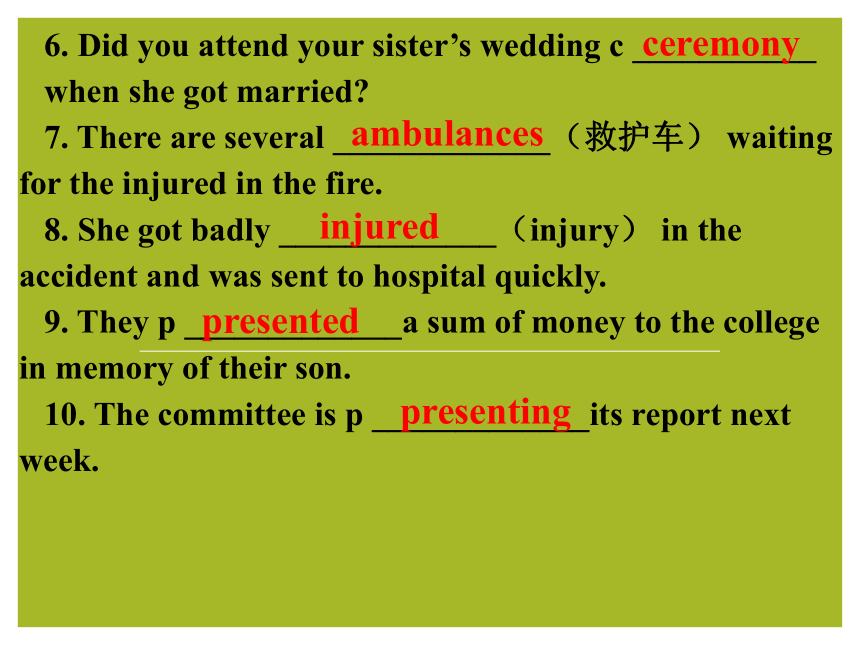
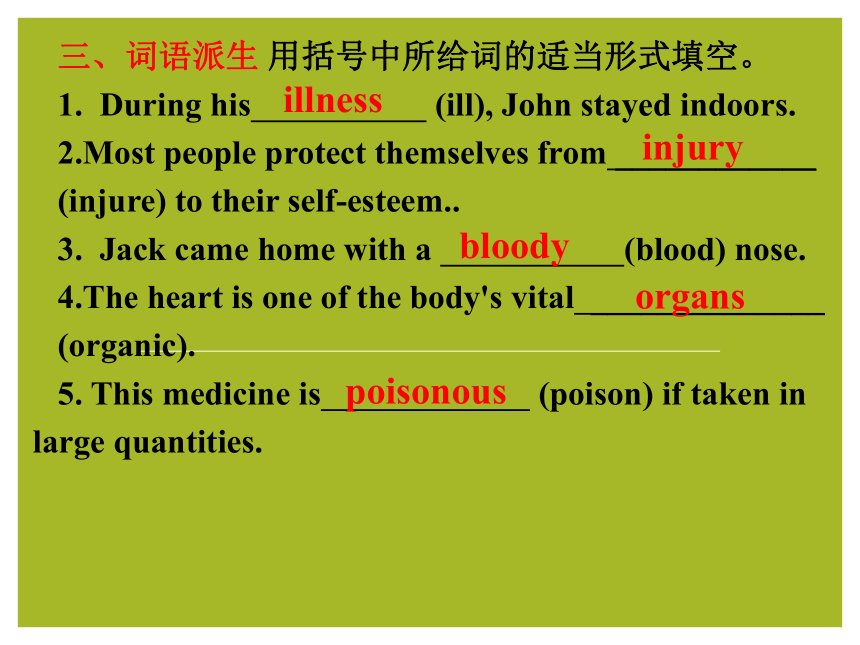

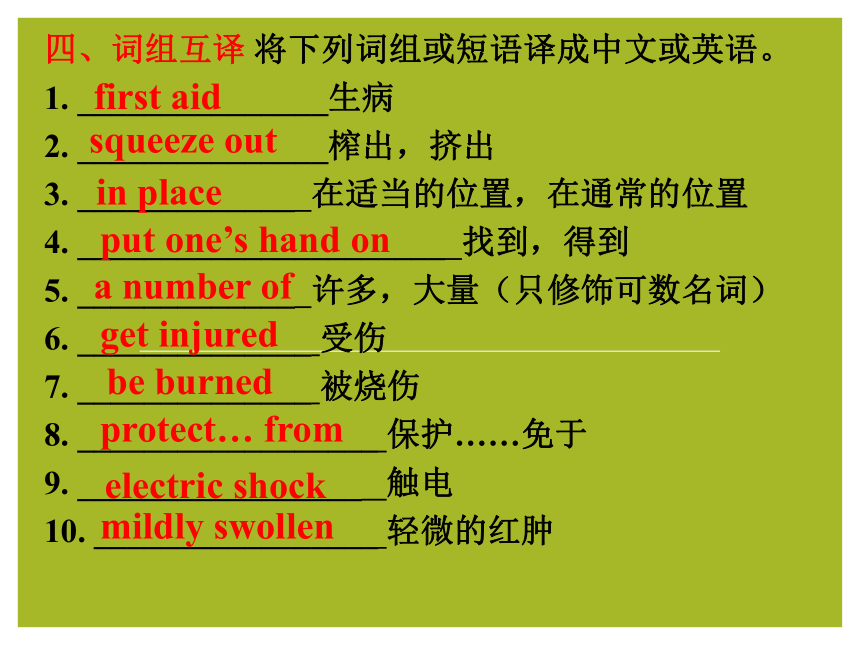
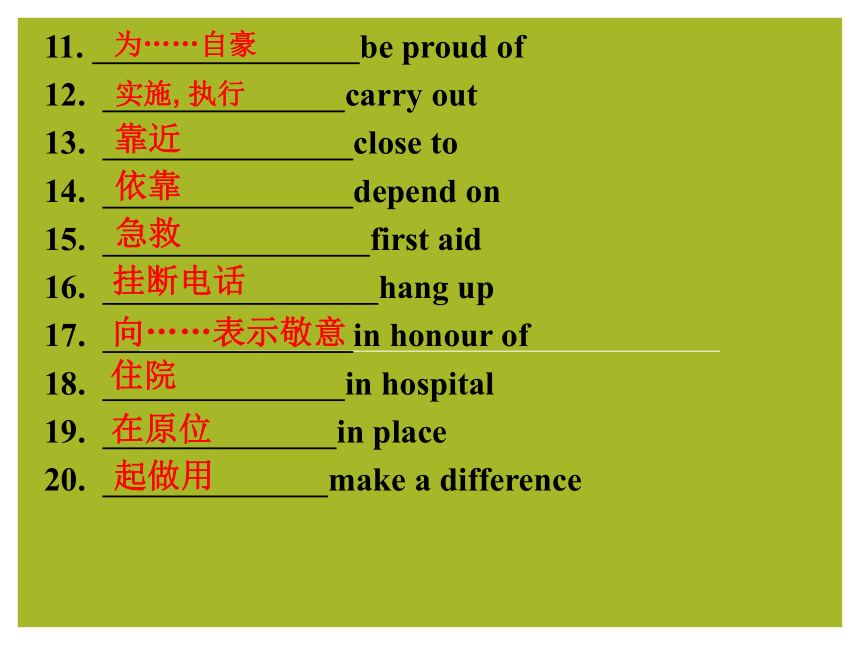
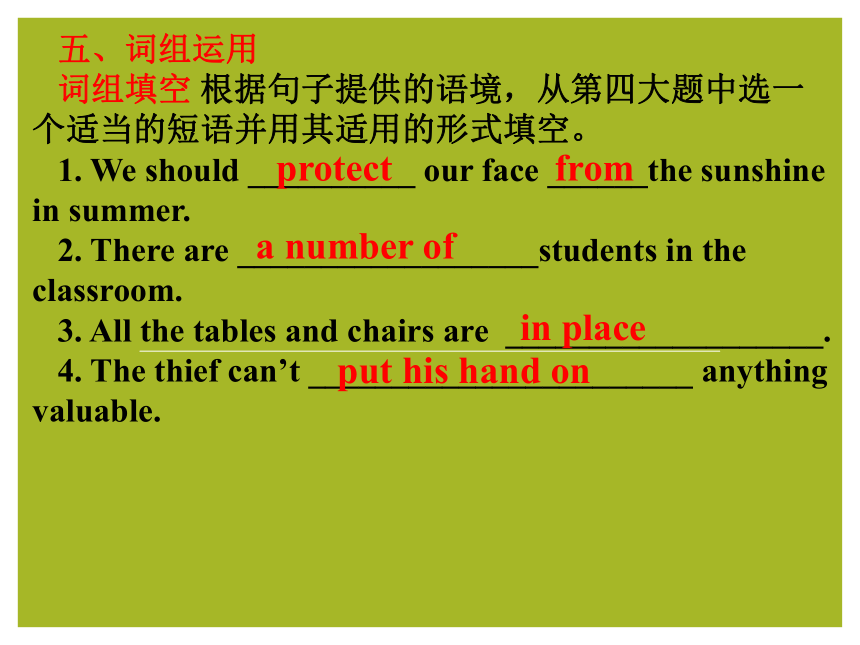
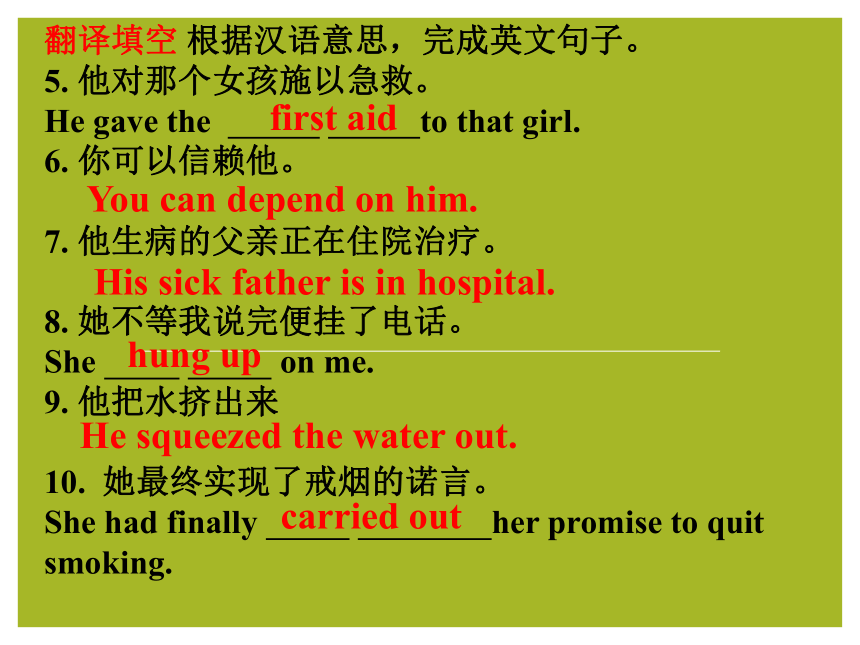
文档简介
(共87张PPT)
一、单词拼写 根据读音、词性和词义写出下列单词。
1. _____________[eid] vt.n. 帮助,救助,支援
2. _____________[5indVEri] n.伤害;损害
3. _____________[bli:d] vi.出血,流血
4. _____________[tFEuk] vt. 使窒息;哽住
5. _____________[5blQdi] a. 血污的;流血的
6. _____________[bE:n] vi. vt.n.发热, 燃烧; 烫伤
7. _____________[5pCizn] n. vt.毒药;毒物;使中毒
8. _____________[5tri:tmEnt] n. 对待;待遇,论述
9. _____________[7reidi5eiFEn] n.发热;辐射,放射物
10. ____________ [maild] a. 温和的,温柔的
aid
injury
bleed
choke
bloody
burn
poison
treatment
radiation
mild
11. _____________ [5aiEn] n. vt铁, 熨斗,烫平
12. _____________[I5lektrIk] a. 电的;发电的
13. _____________[swel] vi. vt肿起,使增长
14. _____________[5dAmidV] n. vt.损害;损失,毁坏
15. _____________[`dVU:ElrI] n. 珠宝;首饰
16. _____________[skwi:z] vt. vi榨,压,榨出,挤出
17. _____________[5simptEm] n.症状,征候,征兆
18. _____________[5serimEni] n.仪式,典礼,礼仪
19. _____________ [5breivEri] n. 勇敢,勇气,壮观
20. _____________[`preFE(r)] n. 压;按;榨, 压迫
pressure
iron
electric
swell
damage
jewellery
squeeze
symptom
ceremony
bravery
二、单词运用 根据句子的结构和意义,在空格处填入一个恰当的单词,或者用括号中所给词的适当形式填空。
1. The villagers are busy repairing the houses d_____________ by the storm.
2. There was an accident on the road last night but there was no___________ (受伤)reported according to the latest news.
3. First aid can be the first step in the _____________ (treat)of burns.
4. The injured person lay on the ground, b _____________ heavily.
5. The p_____________ of the city life forced him to move to the country..
pressure
damaged
injury
treatment
bleeding
6. Did you attend your sister’s wedding c ___________
when she got married?
7. There are several _____________(救护车) waiting for the injured in the fire.
8. She got badly _____________(injury) in the accident and was sent to hospital quickly.
9. They p _____________a sum of money to the college in memory of their son.
10. The committee is p _____________its report next week.
presenting
ceremony
ambulances
injured
presented
三、词语派生 用括号中所给词的适当形式填空。
1. During his (ill), John stayed indoors.
2.Most people protect themselves from ____________
(injure) to their self-esteem..
3. Jack came home with a (blood) nose.
4.The heart is one of the body's vital ______________
(organic).
5. This medicine is (poison) if taken in large quantities.
illness
injury
bloody
organs
poisonous
6. I got an _______(electricity)shock from the wire.
7. They ________ (presentation)him with a bunch of flowers.
8. The policeman showed great _______________ ( brave) in the face of danger.
9. He works well under _______ (press).
10.I think he is the ______ (mildly) man alive in the world.
electric
presented
bravery
pressure
mildest
四、词组互译 将下列词组或短语译成中文或英语。
1. _______________生病
2. _______________榨出,挤出
3. _____________ 在适当的位置,在通常的位置
4. ______________________ 找到,得到
5. _____________ 许多,大量(只修饰可数名词)
6. ______________ 受伤
7. ______________ 被烧伤
8. __________________ 保护……免于
9. _________________ 触电
10. _________________ 轻微的红肿
mildly swollen
first aid
squeeze out
in place
put one’s hand on
a number of
get injured
be burned
protect… from
electric shock
11. be proud of
12. carry out
13. close to
14. depend on
15. first aid
16. hang up
17. in honour of
18. in hospital
19. in place
20. make a difference
起做用
为……自豪
实施, 执行
靠近
依靠
急救
挂断电话
向……表示敬意
住院
在原位
五、词组运用
词组填空 根据句子提供的语境,从第四大题中选一个适当的短语并用其适用的形式填空。
1. We should __________ our face ______the sunshine in summer.
2. There are __________________students in the classroom.
3. All the tables and chairs are ___________________.
4. The thief can’t _______________________ anything valuable.
put his hand on
protect from
a number of
in place
翻译填空 根据汉语意思,完成英文句子。
5. 他对那个女孩施以急救。
He gave the to that girl.
6. 你可以信赖他。
7. 他生病的父亲正在住院治疗。
8. 她不等我说完便挂了电话。
She on me.
9. 他把水挤出来
10. 她最终实现了戒烟的诺言。
She had finally her promise to quit
smoking.
carried out
first aid
You can depend on him.
His sick father is in hospital.
hung up
He squeezed the water out.
Language Points
(about Reading I)
1.…it keeps you warm or cool; it prevents
your body from losing too much water; it
is where you feel cold, heat or pain and it
gives you your sense of touch……皮肤能
保暖或御寒,保持体内水分不过多流
失,正是皮肤让你感到冷热和疼痛,皮
肤还使你有触觉。
Important sentences:
sense of touch触觉
其他表示各种感觉的词还有:
sense of sight视觉;sense of hearing听觉;
sense of taste味觉 sense of smell嗅觉;
sense of humor 幽默感
sense of direction 方向感
sense of urgency紧迫感
2. So as you can imagine, if your skin gets burned, it can be very serious.
该句是一个主从复合句,主句为:So if your skin gets burned, it can be very serious;从句为:as you can imagine.
as引导非限制性定语从句,指代后面的内容,有“正如……”或“就象……”的意思;它所引导的从句位置较灵活,可以位于句首、句中或句末。
另外,该句的主句中还含有一个if引导的条件状语从句。请看类似的句子:
As you can see, if they are not properly protected, the farmlands will become desserts sooner or later.
正如你所看到的,这些农田如果保护不当迟早会变成沙漠。
3. Examples include mild sunburn and burns caused by touching a hot pan, stove or iron for a moment.
(一度烫伤或烧伤的)例子包括轻微的晒伤,以及碰到热锅、炉子或烙铁而导致的烫(烧)伤。
mild在这个句子中的意思是“轻微的、不严重的”。
如:Edward suffered a mild heart attack.爱德华犯了轻微的心脏病。
mild还可以表示“温和的、暖和的;味淡的”
如:She’s the mildest person I have ever met in my life.
她是我平生见到过的最温柔的人了。
4. Remove clothing using scissors if necessary unless it is stuck to the burn.除非衣服粘贴在烧伤面上,否则都要把衣服脱掉。如果需要的话,可以使用剪刀。
a mild climate 温暖的天气
mild cheese 淡味奶酪
unless除非……;如果不……。如:
Don’t make it public unless I agree.
除非我同意,否则不能公布于众。
Unless the destruction of the ozone layer is stopped, the polar ice caps will melt with terrible consequences.
如果不停止对臭氧层的破坏的话,南北两极的冰冠就可能融化并造成可怕的后果。
问题:
你还能再列举几个这样的单词吗?
5. Cool burns immediately with cool but
not icy water.
立即用凉水给伤口冲凉,但不要用冰水。
-y是个形容词后缀。如:
windy有风 hilly多小山的
sleepy困倦的 greeny略呈绿色的
spicy辛辣的 woody树木茂密的
6. Hold the bandage in place with tape.
用胶布把绷带固定。
in place在适当的地方。如:
The librarian put the returned books in place. 图书馆员把还回的图书放到原处。
You’d better put things back in place.
Otherwise, it will be difficult to find things.
你最好把你的东西放回原位, 不然很难找。
in place 还有“准备就绪”的意思。如:
The arrangements for the concert next Saturday are all in place.
周六的音乐会已经准备就绪。
7. If burns are on arms or legs, keep them higher than the heart, if possible.
如果烧伤的部位在臂部或腿部,要尽可能反手臂或腿抬到高于心脏的位置。
上下肢被烧伤后,应将患肢抬高于心脏,这是为了促进血液回流,防止烧伤处出现水肿。
Important words about Reading 1:
1. aid
作动词 帮助; 援助
He aided me in business.
I aided her to continue her study.
At Christmas, many organizations aid the poor.
作名词 帮助; 援助 (不可数)
Teachers give their lessons with the aid of computers.
He raised money in aid of the sick.
2. temporary 暂时的,临时的
temporary relief from pain
短暂的解痛
temporary work/ solution
临时工作/解决办法
3. fall ill 生病
fall + adj.
睡着了 ____________
清醒了 _____________
安静下来 _____________
His son suddenly ____ ___ last week.
他儿子突然生病了。
fall asleep
fall awake
fall silent
fell ill
4. injure v.
______ n. ______ adj.
injury to sth. …(部位)的伤
他干活时腿受了重伤。(injury)
He got ________________ at work.
他在意外事故中受了伤。(injure)
He __________ in the accident.
injuries to the legs
got injured
injury
injured
hurt/wound/injure区别:
You'll hurt her feelings if you forget
her birthday.
The soldier was wounded in the arm.
He was badly injured in the accident.
Last night a terrible storm hit the area
and many people were injured.
My stomach hurts because I have eaten
too many apples.
5. bleed 流血
bleed—bled—bled
My heart bleeds for those poor
children.
His nose is bleeding. /He is bleeding at
the nose.
bloody a.
7. get+过去分词 表被动或状态
The computer got damaged when we
were moving.
My bike is getting repaired now.
My glasses got broken while I was
playing basketball.
Peter and Mary got married last
year.
9. Remove clothing using scissors if necessary unless it is stuck to the burn.
stick
stick sth. to sth. 粘住
Stick the glue to my fingers.
10. jewellery/jewel
jewellery n. 珠宝的总称 (不可数)
jewel n. 珠宝,首饰 (可数)
The jewels were kept in the safe.
She appeared at the reception wearing
her finest jewels.
She locked her ______in the ________box.
jewels
jewellery
11. squeeze 挤;压;塞
The car was full, but I managed to
squeeze in.
He squeeze everything into a suitcase.
squeeze from
squeeze out
squeeze through
从身上榨取
挤出
挤着通过
12. in place /out of place
放在应放的位置/地方放的不对; 不合适
I like to have everything in place.
Her dress was out of place at the
ceremony.
I. 用括号内所给词的适当形式填空。
1. There are over 115 different kinds of ________ (poison) snakes in Australia.
2. Doctors in that hospital are developing a new _________ (treat) for cancer.
3. He is a ____ (mildly) person who never shouts.
4. This machine has an ________ (electric) fault.(与电有关的)
poisonous
treatment
mild
electrical
5. His face was ______ (swell) up with toothache.
6. If he _____ (blood) too much, his life will be in danger.
7. His foot was burned by hot water and there were several ______ (water) blisters on it.
swollen
bleeds
watery
II. 根据句意, 选择适当的单词或短语
并用其适当形式填空。
1. protect; defend
a. Taking an umbrella can _______ you from rain.
b. Schools should give children lessons on how to _____________ themselves.
protect
protect / defend
2. wound; injure; hurt
a. She was badly ____________ when she fell off her bike.
b. His leg _____ when he walks.
c. The soldier got a serious ______ in the war.
hurt / injured
wound
hurts
3. insist on; stick to
a. Once a decision has been made, all of us should ______ it.
b. They _________ leaving that day.
c. He always _______ his promise.
sticks to
stick to
insisted on
4. cut off; cut out; cut up
He was _________ the meat and wanted to make dumplings.
b. You can _______ the unimportant details.
c. The village was ______ by heavy snow for a month.
cut off
cutting up
cut out
III. 用适当的介词填空。
1. We don’t want to hear your opinions; stick __ the facts.
2. The robber robbed the bank __ force.
3. Whether we will have a picnic tomorrow depends __ the weather.
4. He was _____ great pain after he broke his arm.
to
by
on
in / of
5. They decided to join to fight ______ the enemy and defend their country.
6. As soon as all the chairs are __ place, we can let the people in.
Don’t take any notice __ what he says.
8. _____ the aid of our teacher, we got through all the difficulties.
With
against
in
of
V. 下列各句均有一处错误, 请指出并
改正.
If you want to change for a double room, you’ll have to pay other 30 yuan.
2. First the curtain caught a fire and then the bed clothes.
3. I like that in the autumn when the weather is clear and bright.
another
it
4. To my disappointment, none of my parents answered the telephone.
5. She knew there was no doubt whether he was lying to her.
neither
that
6. It was in the street where I met John.
7. The speech is in the place for this occasion.
that
VI. 根据括号内所给的提示将下列句子 翻译成英语。
1. 他被年轻人挤出了人才市场。(squeeze out of)
2. 我一次又一次地警告过你不要再做那么傻的事。 (over and over again)
He was squeezed out of the job market by young people.
I’ve warned you over and over again not to do such silly things.
3. 用胶带固定好绷带。 (in place)
4. 风暴对庄稼没造成多大的破坏。(do damage to)
5. 我不怀疑他能按时完成任务。 (doubt)
Hold the bandage in place with tape.
The storm didn’t do much damage to the crops.
I don’t doubt that he can finish the task on time.
6. 坚持做完一件事。 (stick to)
7. 法律一旦被制订,就应该被认真执行。 (carry out)
8. 正是那个护士的快速反应和急救知识挽救了男孩的生命。
Stick to a task until it is finished.
Laws must be carried out seriously once made.
It was the nurse’s quick action and knowledge of first aid that saved the boy.
Language points for Reading II
1. John was presented with his award at a ceremony which recognised the bravery of ten people who had saved the life of another.
be presented with
=be given with …
which 引导一个定语从句
who引导一个定语从句
2. They discovered that Anne Slade, mother of three, had been stabbed repeatedly with a knife.
repeatedly 是由动词repeat的过去分词加-ly构成。类似的词汇有:
excitedly 兴奋地
worriedly 焦急地
contentedly 满足地
unexpectedly 出乎意料地
3. It was John’s quick action and knowledge of first aid that saved Ms Slade’s life.
It is / was… that… 强调句
It was his words that hurt her.
4. put one’s hands on
I know their address is here
somewhere, but I can’t put my hands
on it (找到它) right now.
Whatever he puts his hands on (他无论
着手做什么), he does it extraordinarily
well.
5. John used these to treat the most severe injuries to Ms Slade’s hand.
treat 治疗; 对待
It’s wrong to treat animals as if they had no feelings.
This boy is being treated for a heart condition.
=deal with
Ellipsis
Grammar
为了使语言简洁或避免重复,
我们要怎样做呢?
本单元我们将接触一种新的语法现象
省略
为了使讲话和行文简洁,句中某些成分有时可以省略。省略可分为以下几种情况:
1) (You) Come in, please.
2) (I) See you tomorrow.
3) (I) Thank you for your help.
4) (I) Beg your pardon.
简单句中的省略
1) (It) Sounds a good idea.
2) (Will you) Have a smoke?
3) (Would you like) Something to drink?
4) (You come) This way, please.
可以省略宾语的全部;
可以省略作宾语的动词不定式, 只保留to,但如果该宾语是动词be或完成时态,则须在to后加上be或have。
1) ---Do you know Miss Hu?
---I don’t know (her).
2) Don’t touch anything unless the teacher tells you to (touch).
3) ---Are you a teacher?
---No, but I want to be (a teacher).
4) ---He hasn’t finished the task.
---Well, he ought to have (finish it).
---Are you thirsty?
---Yes, I am (thirsty).
2) His brother isn’t lazy.
Nor is his sister (lazy).
1) --- Are you feeling better now?
--- (I’m feeling) Better (now).
2) --- When did you read the novel?
--- (I read it) Long ago.
3) Let’s meet at the school gate as the
same as (we met) yesterday.
两个并列分句中,后一分句常省略与前一分句中相同的部分.
1) My father is a doctor and my mother (is) a nurse.
2) I study at college and my sister (studies) at high school.
3) Lin’s father was not at home, but his mother was (at home).
1) (I’m) Sorry to hear that you are ill.
2) (It’s a) Pity that you missed such a
good chance.
They do not visit their parents as much as they ought to (visit their parents).
The sooner (you do it), the better
(it will be).
1. 连词的that省略
(1)宾语从句中常省略that, 但多个宾语
从句并列时, 通常只省略第一个that
He said (that) the text was very important and that we should learn it by heart.
(2)在定语从句中that在作宾语时才能省略
The book (that) I borrowed yesterday
was hers.
2. 在某些状语从句中,当从句的主语与主句的主语一致或者从句主语为it,且从句谓语部分有be动词时,可省去“主语+be”部分
1 When (he was) still a boy of 10, he had
to work day and night.
2 As (he was) a child, he lived in India.
3 If (you are) asked you may come in.
4 Though (he is) young, he knows a lot.
3. 不定式符号to的省略
(1)并列的不定式可省去后面的 to。
I told him to sit down and wait for a moment.
(2) help 当“帮助”讲时,后面的宾语或宾
补的不定式符号to可带可不带。
I will help (to) do it for you.
I will help you (to) do it.
(3)介词but前若有动词do, 后面不定式不
带to。 The boy did nothing but play.
(4) 某些使役动词(let, make, have)及感官动词(see, watch, hear, notice, observe, feel, look at, listen to等)后面作宾语补足语的不定式一定要省去 to, 但在被动语态中须将to 复原。
I saw the boy fall from the tree.
The boy was seen to fall from the tree.
The boss made us work 12 hours a day.
We were made to work 12 hours a day.
(5) 主语从句中有动词do,后面作表语的不定式的 to可带可不带。
What we can do now is (to) wait.
(6) find 当“发现”讲时,后面作宾语补足语的不定式符号to可带可不带。
We found him (to) work very hard at the experiment.
但如果是不定式 to be,则不能省略。
She found him to be dishonest.
4.条件从句中有should, were或had时,可以省略if,但要将should, were或had提至句首。
If I were you, I would give it up.
Were I you, I would give it up.
If it were not for your advice, we couldn’t have got over the difficulties.
Were it not for your advice, we couldn’t have got over the difficulties.
If I had had time, I would have run round that lake again.
Had I had time, I would have run round that lake again.
If there should be a flood, what should we do?
Should there be a flood, what should we do?
Now it’s your turn to find out what have been left out.
1. Haven’t seen you for ages.
?2. Some more tea?
3. Sounds like a good idea.
I haven’t seen you for ages.
Would you like some more tea?
That/It sounds like a good idea.
It doesn’t matter.
I’m sorry to hear that.
4. Doesn’t matter.
5. Sorry to hear that.
6. Pity you couldn’t come
7. This way, please.
It’s / What a pity you couldn’t come.
? Step / Come this way, please.
8. Terrible weather!
9. Joining us for a drink?
10. Going to the supermarket?
What terrible weather it is!
Are you joining us for a drink?
? Are you going to the supermarket?
Choose the best answers.
1)----Tomorrow is a holiday. Why are
you doing your homework?
-----I am doing these exercises now so
that I won’t have _____ on Sunday.
A. it B. them C. for D. to
2)----Shall I invite Ann to my birthday
party tomorrow evening?
----Yes. It’ll be fine if you______.
A. are B. can C. invite D. do
3)---- Aren’t you the manager?
---- No, and I______
A.?don’t want to B. don’t want to be
C. don’t want be D. don’t want
4)---I’ll be away on a business trip. Would
you mind looking after my cat?
---Not at all. ______.
A. I’ve no time B. I’d rather not
C. I’d like it D. I’d be glad to
5)---- Won’t you have another try?
---- ________.
A. Yes, I will have B. Yes, I won’t have
C. Yes, I won’t D. Yes, I will
6)-----I won’t do it any more.
-----_______?
A. Why not
B. Why don’t do any more
C. Why not do
D. Why don’t
7)----Do you think it will snow tomorrow?
----______.
A.I don’t think B. No, I don’t think
C. I don’t think so D. No, I don’t so
8)----Have you fed the cat?
----No, but______.
A. I’m B. I am
C. I’m just going D. I’m just going to
一、单词拼写 根据读音、词性和词义写出下列单词。
1. _____________[eid] vt.n. 帮助,救助,支援
2. _____________[5indVEri] n.伤害;损害
3. _____________[bli:d] vi.出血,流血
4. _____________[tFEuk] vt. 使窒息;哽住
5. _____________[5blQdi] a. 血污的;流血的
6. _____________[bE:n] vi. vt.n.发热, 燃烧; 烫伤
7. _____________[5pCizn] n. vt.毒药;毒物;使中毒
8. _____________[5tri:tmEnt] n. 对待;待遇,论述
9. _____________[7reidi5eiFEn] n.发热;辐射,放射物
10. ____________ [maild] a. 温和的,温柔的
aid
injury
bleed
choke
bloody
burn
poison
treatment
radiation
mild
11. _____________ [5aiEn] n. vt铁, 熨斗,烫平
12. _____________[I5lektrIk] a. 电的;发电的
13. _____________[swel] vi. vt肿起,使增长
14. _____________[5dAmidV] n. vt.损害;损失,毁坏
15. _____________[`dVU:ElrI] n. 珠宝;首饰
16. _____________[skwi:z] vt. vi榨,压,榨出,挤出
17. _____________[5simptEm] n.症状,征候,征兆
18. _____________[5serimEni] n.仪式,典礼,礼仪
19. _____________ [5breivEri] n. 勇敢,勇气,壮观
20. _____________[`preFE(r)] n. 压;按;榨, 压迫
pressure
iron
electric
swell
damage
jewellery
squeeze
symptom
ceremony
bravery
二、单词运用 根据句子的结构和意义,在空格处填入一个恰当的单词,或者用括号中所给词的适当形式填空。
1. The villagers are busy repairing the houses d_____________ by the storm.
2. There was an accident on the road last night but there was no___________ (受伤)reported according to the latest news.
3. First aid can be the first step in the _____________ (treat)of burns.
4. The injured person lay on the ground, b _____________ heavily.
5. The p_____________ of the city life forced him to move to the country..
pressure
damaged
injury
treatment
bleeding
6. Did you attend your sister’s wedding c ___________
when she got married?
7. There are several _____________(救护车) waiting for the injured in the fire.
8. She got badly _____________(injury) in the accident and was sent to hospital quickly.
9. They p _____________a sum of money to the college in memory of their son.
10. The committee is p _____________its report next week.
presenting
ceremony
ambulances
injured
presented
三、词语派生 用括号中所给词的适当形式填空。
1. During his (ill), John stayed indoors.
2.Most people protect themselves from ____________
(injure) to their self-esteem..
3. Jack came home with a (blood) nose.
4.The heart is one of the body's vital ______________
(organic).
5. This medicine is (poison) if taken in large quantities.
illness
injury
bloody
organs
poisonous
6. I got an _______(electricity)shock from the wire.
7. They ________ (presentation)him with a bunch of flowers.
8. The policeman showed great _______________ ( brave) in the face of danger.
9. He works well under _______ (press).
10.I think he is the ______ (mildly) man alive in the world.
electric
presented
bravery
pressure
mildest
四、词组互译 将下列词组或短语译成中文或英语。
1. _______________生病
2. _______________榨出,挤出
3. _____________ 在适当的位置,在通常的位置
4. ______________________ 找到,得到
5. _____________ 许多,大量(只修饰可数名词)
6. ______________ 受伤
7. ______________ 被烧伤
8. __________________ 保护……免于
9. _________________ 触电
10. _________________ 轻微的红肿
mildly swollen
first aid
squeeze out
in place
put one’s hand on
a number of
get injured
be burned
protect… from
electric shock
11. be proud of
12. carry out
13. close to
14. depend on
15. first aid
16. hang up
17. in honour of
18. in hospital
19. in place
20. make a difference
起做用
为……自豪
实施, 执行
靠近
依靠
急救
挂断电话
向……表示敬意
住院
在原位
五、词组运用
词组填空 根据句子提供的语境,从第四大题中选一个适当的短语并用其适用的形式填空。
1. We should __________ our face ______the sunshine in summer.
2. There are __________________students in the classroom.
3. All the tables and chairs are ___________________.
4. The thief can’t _______________________ anything valuable.
put his hand on
protect from
a number of
in place
翻译填空 根据汉语意思,完成英文句子。
5. 他对那个女孩施以急救。
He gave the to that girl.
6. 你可以信赖他。
7. 他生病的父亲正在住院治疗。
8. 她不等我说完便挂了电话。
She on me.
9. 他把水挤出来
10. 她最终实现了戒烟的诺言。
She had finally her promise to quit
smoking.
carried out
first aid
You can depend on him.
His sick father is in hospital.
hung up
He squeezed the water out.
Language Points
(about Reading I)
1.…it keeps you warm or cool; it prevents
your body from losing too much water; it
is where you feel cold, heat or pain and it
gives you your sense of touch……皮肤能
保暖或御寒,保持体内水分不过多流
失,正是皮肤让你感到冷热和疼痛,皮
肤还使你有触觉。
Important sentences:
sense of touch触觉
其他表示各种感觉的词还有:
sense of sight视觉;sense of hearing听觉;
sense of taste味觉 sense of smell嗅觉;
sense of humor 幽默感
sense of direction 方向感
sense of urgency紧迫感
2. So as you can imagine, if your skin gets burned, it can be very serious.
该句是一个主从复合句,主句为:So if your skin gets burned, it can be very serious;从句为:as you can imagine.
as引导非限制性定语从句,指代后面的内容,有“正如……”或“就象……”的意思;它所引导的从句位置较灵活,可以位于句首、句中或句末。
另外,该句的主句中还含有一个if引导的条件状语从句。请看类似的句子:
As you can see, if they are not properly protected, the farmlands will become desserts sooner or later.
正如你所看到的,这些农田如果保护不当迟早会变成沙漠。
3. Examples include mild sunburn and burns caused by touching a hot pan, stove or iron for a moment.
(一度烫伤或烧伤的)例子包括轻微的晒伤,以及碰到热锅、炉子或烙铁而导致的烫(烧)伤。
mild在这个句子中的意思是“轻微的、不严重的”。
如:Edward suffered a mild heart attack.爱德华犯了轻微的心脏病。
mild还可以表示“温和的、暖和的;味淡的”
如:She’s the mildest person I have ever met in my life.
她是我平生见到过的最温柔的人了。
4. Remove clothing using scissors if necessary unless it is stuck to the burn.除非衣服粘贴在烧伤面上,否则都要把衣服脱掉。如果需要的话,可以使用剪刀。
a mild climate 温暖的天气
mild cheese 淡味奶酪
unless除非……;如果不……。如:
Don’t make it public unless I agree.
除非我同意,否则不能公布于众。
Unless the destruction of the ozone layer is stopped, the polar ice caps will melt with terrible consequences.
如果不停止对臭氧层的破坏的话,南北两极的冰冠就可能融化并造成可怕的后果。
问题:
你还能再列举几个这样的单词吗?
5. Cool burns immediately with cool but
not icy water.
立即用凉水给伤口冲凉,但不要用冰水。
-y是个形容词后缀。如:
windy有风 hilly多小山的
sleepy困倦的 greeny略呈绿色的
spicy辛辣的 woody树木茂密的
6. Hold the bandage in place with tape.
用胶布把绷带固定。
in place在适当的地方。如:
The librarian put the returned books in place. 图书馆员把还回的图书放到原处。
You’d better put things back in place.
Otherwise, it will be difficult to find things.
你最好把你的东西放回原位, 不然很难找。
in place 还有“准备就绪”的意思。如:
The arrangements for the concert next Saturday are all in place.
周六的音乐会已经准备就绪。
7. If burns are on arms or legs, keep them higher than the heart, if possible.
如果烧伤的部位在臂部或腿部,要尽可能反手臂或腿抬到高于心脏的位置。
上下肢被烧伤后,应将患肢抬高于心脏,这是为了促进血液回流,防止烧伤处出现水肿。
Important words about Reading 1:
1. aid
作动词 帮助; 援助
He aided me in business.
I aided her to continue her study.
At Christmas, many organizations aid the poor.
作名词 帮助; 援助 (不可数)
Teachers give their lessons with the aid of computers.
He raised money in aid of the sick.
2. temporary 暂时的,临时的
temporary relief from pain
短暂的解痛
temporary work/ solution
临时工作/解决办法
3. fall ill 生病
fall + adj.
睡着了 ____________
清醒了 _____________
安静下来 _____________
His son suddenly ____ ___ last week.
他儿子突然生病了。
fall asleep
fall awake
fall silent
fell ill
4. injure v.
______ n. ______ adj.
injury to sth. …(部位)的伤
他干活时腿受了重伤。(injury)
He got ________________ at work.
他在意外事故中受了伤。(injure)
He __________ in the accident.
injuries to the legs
got injured
injury
injured
hurt/wound/injure区别:
You'll hurt her feelings if you forget
her birthday.
The soldier was wounded in the arm.
He was badly injured in the accident.
Last night a terrible storm hit the area
and many people were injured.
My stomach hurts because I have eaten
too many apples.
5. bleed 流血
bleed—bled—bled
My heart bleeds for those poor
children.
His nose is bleeding. /He is bleeding at
the nose.
bloody a.
7. get+过去分词 表被动或状态
The computer got damaged when we
were moving.
My bike is getting repaired now.
My glasses got broken while I was
playing basketball.
Peter and Mary got married last
year.
9. Remove clothing using scissors if necessary unless it is stuck to the burn.
stick
stick sth. to sth. 粘住
Stick the glue to my fingers.
10. jewellery/jewel
jewellery n. 珠宝的总称 (不可数)
jewel n. 珠宝,首饰 (可数)
The jewels were kept in the safe.
She appeared at the reception wearing
her finest jewels.
She locked her ______in the ________box.
jewels
jewellery
11. squeeze 挤;压;塞
The car was full, but I managed to
squeeze in.
He squeeze everything into a suitcase.
squeeze from
squeeze out
squeeze through
从身上榨取
挤出
挤着通过
12. in place /out of place
放在应放的位置/地方放的不对; 不合适
I like to have everything in place.
Her dress was out of place at the
ceremony.
I. 用括号内所给词的适当形式填空。
1. There are over 115 different kinds of ________ (poison) snakes in Australia.
2. Doctors in that hospital are developing a new _________ (treat) for cancer.
3. He is a ____ (mildly) person who never shouts.
4. This machine has an ________ (electric) fault.(与电有关的)
poisonous
treatment
mild
electrical
5. His face was ______ (swell) up with toothache.
6. If he _____ (blood) too much, his life will be in danger.
7. His foot was burned by hot water and there were several ______ (water) blisters on it.
swollen
bleeds
watery
II. 根据句意, 选择适当的单词或短语
并用其适当形式填空。
1. protect; defend
a. Taking an umbrella can _______ you from rain.
b. Schools should give children lessons on how to _____________ themselves.
protect
protect / defend
2. wound; injure; hurt
a. She was badly ____________ when she fell off her bike.
b. His leg _____ when he walks.
c. The soldier got a serious ______ in the war.
hurt / injured
wound
hurts
3. insist on; stick to
a. Once a decision has been made, all of us should ______ it.
b. They _________ leaving that day.
c. He always _______ his promise.
sticks to
stick to
insisted on
4. cut off; cut out; cut up
He was _________ the meat and wanted to make dumplings.
b. You can _______ the unimportant details.
c. The village was ______ by heavy snow for a month.
cut off
cutting up
cut out
III. 用适当的介词填空。
1. We don’t want to hear your opinions; stick __ the facts.
2. The robber robbed the bank __ force.
3. Whether we will have a picnic tomorrow depends __ the weather.
4. He was _____ great pain after he broke his arm.
to
by
on
in / of
5. They decided to join to fight ______ the enemy and defend their country.
6. As soon as all the chairs are __ place, we can let the people in.
Don’t take any notice __ what he says.
8. _____ the aid of our teacher, we got through all the difficulties.
With
against
in
of
V. 下列各句均有一处错误, 请指出并
改正.
If you want to change for a double room, you’ll have to pay other 30 yuan.
2. First the curtain caught a fire and then the bed clothes.
3. I like that in the autumn when the weather is clear and bright.
another
it
4. To my disappointment, none of my parents answered the telephone.
5. She knew there was no doubt whether he was lying to her.
neither
that
6. It was in the street where I met John.
7. The speech is in the place for this occasion.
that
VI. 根据括号内所给的提示将下列句子 翻译成英语。
1. 他被年轻人挤出了人才市场。(squeeze out of)
2. 我一次又一次地警告过你不要再做那么傻的事。 (over and over again)
He was squeezed out of the job market by young people.
I’ve warned you over and over again not to do such silly things.
3. 用胶带固定好绷带。 (in place)
4. 风暴对庄稼没造成多大的破坏。(do damage to)
5. 我不怀疑他能按时完成任务。 (doubt)
Hold the bandage in place with tape.
The storm didn’t do much damage to the crops.
I don’t doubt that he can finish the task on time.
6. 坚持做完一件事。 (stick to)
7. 法律一旦被制订,就应该被认真执行。 (carry out)
8. 正是那个护士的快速反应和急救知识挽救了男孩的生命。
Stick to a task until it is finished.
Laws must be carried out seriously once made.
It was the nurse’s quick action and knowledge of first aid that saved the boy.
Language points for Reading II
1. John was presented with his award at a ceremony which recognised the bravery of ten people who had saved the life of another.
be presented with
=be given with …
which 引导一个定语从句
who引导一个定语从句
2. They discovered that Anne Slade, mother of three, had been stabbed repeatedly with a knife.
repeatedly 是由动词repeat的过去分词加-ly构成。类似的词汇有:
excitedly 兴奋地
worriedly 焦急地
contentedly 满足地
unexpectedly 出乎意料地
3. It was John’s quick action and knowledge of first aid that saved Ms Slade’s life.
It is / was… that… 强调句
It was his words that hurt her.
4. put one’s hands on
I know their address is here
somewhere, but I can’t put my hands
on it (找到它) right now.
Whatever he puts his hands on (他无论
着手做什么), he does it extraordinarily
well.
5. John used these to treat the most severe injuries to Ms Slade’s hand.
treat 治疗; 对待
It’s wrong to treat animals as if they had no feelings.
This boy is being treated for a heart condition.
=deal with
Ellipsis
Grammar
为了使语言简洁或避免重复,
我们要怎样做呢?
本单元我们将接触一种新的语法现象
省略
为了使讲话和行文简洁,句中某些成分有时可以省略。省略可分为以下几种情况:
1) (You) Come in, please.
2) (I) See you tomorrow.
3) (I) Thank you for your help.
4) (I) Beg your pardon.
简单句中的省略
1) (It) Sounds a good idea.
2) (Will you) Have a smoke?
3) (Would you like) Something to drink?
4) (You come) This way, please.
可以省略宾语的全部;
可以省略作宾语的动词不定式, 只保留to,但如果该宾语是动词be或完成时态,则须在to后加上be或have。
1) ---Do you know Miss Hu?
---I don’t know (her).
2) Don’t touch anything unless the teacher tells you to (touch).
3) ---Are you a teacher?
---No, but I want to be (a teacher).
4) ---He hasn’t finished the task.
---Well, he ought to have (finish it).
---Are you thirsty?
---Yes, I am (thirsty).
2) His brother isn’t lazy.
Nor is his sister (lazy).
1) --- Are you feeling better now?
--- (I’m feeling) Better (now).
2) --- When did you read the novel?
--- (I read it) Long ago.
3) Let’s meet at the school gate as the
same as (we met) yesterday.
两个并列分句中,后一分句常省略与前一分句中相同的部分.
1) My father is a doctor and my mother (is) a nurse.
2) I study at college and my sister (studies) at high school.
3) Lin’s father was not at home, but his mother was (at home).
1) (I’m) Sorry to hear that you are ill.
2) (It’s a) Pity that you missed such a
good chance.
They do not visit their parents as much as they ought to (visit their parents).
The sooner (you do it), the better
(it will be).
1. 连词的that省略
(1)宾语从句中常省略that, 但多个宾语
从句并列时, 通常只省略第一个that
He said (that) the text was very important and that we should learn it by heart.
(2)在定语从句中that在作宾语时才能省略
The book (that) I borrowed yesterday
was hers.
2. 在某些状语从句中,当从句的主语与主句的主语一致或者从句主语为it,且从句谓语部分有be动词时,可省去“主语+be”部分
1 When (he was) still a boy of 10, he had
to work day and night.
2 As (he was) a child, he lived in India.
3 If (you are) asked you may come in.
4 Though (he is) young, he knows a lot.
3. 不定式符号to的省略
(1)并列的不定式可省去后面的 to。
I told him to sit down and wait for a moment.
(2) help 当“帮助”讲时,后面的宾语或宾
补的不定式符号to可带可不带。
I will help (to) do it for you.
I will help you (to) do it.
(3)介词but前若有动词do, 后面不定式不
带to。 The boy did nothing but play.
(4) 某些使役动词(let, make, have)及感官动词(see, watch, hear, notice, observe, feel, look at, listen to等)后面作宾语补足语的不定式一定要省去 to, 但在被动语态中须将to 复原。
I saw the boy fall from the tree.
The boy was seen to fall from the tree.
The boss made us work 12 hours a day.
We were made to work 12 hours a day.
(5) 主语从句中有动词do,后面作表语的不定式的 to可带可不带。
What we can do now is (to) wait.
(6) find 当“发现”讲时,后面作宾语补足语的不定式符号to可带可不带。
We found him (to) work very hard at the experiment.
但如果是不定式 to be,则不能省略。
She found him to be dishonest.
4.条件从句中有should, were或had时,可以省略if,但要将should, were或had提至句首。
If I were you, I would give it up.
Were I you, I would give it up.
If it were not for your advice, we couldn’t have got over the difficulties.
Were it not for your advice, we couldn’t have got over the difficulties.
If I had had time, I would have run round that lake again.
Had I had time, I would have run round that lake again.
If there should be a flood, what should we do?
Should there be a flood, what should we do?
Now it’s your turn to find out what have been left out.
1. Haven’t seen you for ages.
?2. Some more tea?
3. Sounds like a good idea.
I haven’t seen you for ages.
Would you like some more tea?
That/It sounds like a good idea.
It doesn’t matter.
I’m sorry to hear that.
4. Doesn’t matter.
5. Sorry to hear that.
6. Pity you couldn’t come
7. This way, please.
It’s / What a pity you couldn’t come.
? Step / Come this way, please.
8. Terrible weather!
9. Joining us for a drink?
10. Going to the supermarket?
What terrible weather it is!
Are you joining us for a drink?
? Are you going to the supermarket?
Choose the best answers.
1)----Tomorrow is a holiday. Why are
you doing your homework?
-----I am doing these exercises now so
that I won’t have _____ on Sunday.
A. it B. them C. for D. to
2)----Shall I invite Ann to my birthday
party tomorrow evening?
----Yes. It’ll be fine if you______.
A. are B. can C. invite D. do
3)---- Aren’t you the manager?
---- No, and I______
A.?don’t want to B. don’t want to be
C. don’t want be D. don’t want
4)---I’ll be away on a business trip. Would
you mind looking after my cat?
---Not at all. ______.
A. I’ve no time B. I’d rather not
C. I’d like it D. I’d be glad to
5)---- Won’t you have another try?
---- ________.
A. Yes, I will have B. Yes, I won’t have
C. Yes, I won’t D. Yes, I will
6)-----I won’t do it any more.
-----_______?
A. Why not
B. Why don’t do any more
C. Why not do
D. Why don’t
7)----Do you think it will snow tomorrow?
----______.
A.I don’t think B. No, I don’t think
C. I don’t think so D. No, I don’t so
8)----Have you fed the cat?
----No, but______.
A. I’m B. I am
C. I’m just going D. I’m just going to
